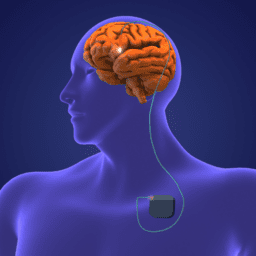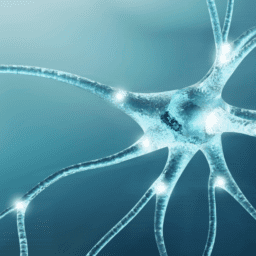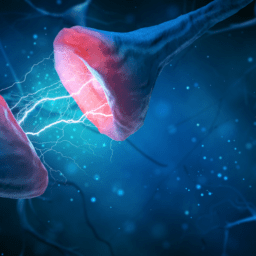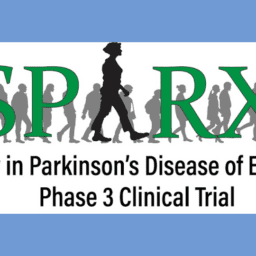Links between COVID and Parkinson’s. A golf versus tai chi showdown. Peptides and proteins. Dogs and diagnostics. A “live action” PINK1 video. Here’s what’s new in the world of Parkinson’s this month. Happy holidays!
PARKINSON’S ARTICLES
- In the journal ACS Chemical Neuroscience, researchers at the University of Twente in the Netherlands explain data from in vitro experiments that found that the SARS-CoV-2 N-protein (better known as the novel coronavirus that can cause COVID-19) interacts with alpha-synuclein in the brain and speeds the formation of amyloid fibrils and the death of dopamine-producing neurons, a hallmark of Parkinson’s. The findings suggest that, “while the link remains hazy, this observation could potentially explain how relatively young COVID-19 patients have developed Parkinson’s soon after contracting the virus.”
- Another study shows the potential link between Parkinson’s and the flu. The report, recently published in JAMA Neurology, found after analyzing the Danish health care databases that compared with people who had not had a flu infection, people who had the flu had a 70 percent higher risk of Parkinson’s 10 years later, and a 90 percent higher risk 15 years later. However, “this is not evidence of a causal link between flu infection and Parkinson’s,” the lead author says. “Our study adds to a broader literature, and we shouldn’t overstate the results.”
- Supporting results from an earlier study from Taiwan, a new study conducted in the UK and published in Clinical Parkinsonism & Related Disorders found that people with osteoarthritis may be at increased risk of developing Parkinson’s. The study included 260,224 people with Parkinson’s and found that the 10-year cumulative incidence of Parkinson’s was 1.2% in people with osteoarthritis and 0.6% in their counterparts without osteoarthritis. The adjusted Cox regression model further showed a positive and significant association between osteoarthritis and the incidence of Parkinson’s, and similar results were obtained in all sex and age subgroups.
- Results from an exploratory, match-controlled, cross-sectional study conducted in a medical school laboratory from 2017–2020 found that veterans who experienced mild traumatic head injuries had a 56% increased risk of developing Parkinson’s within 12 years of the injury.
- A prospective data analysis of 55 people with Parkinson’s, conducted in Italy and published in the International Journal of Environmental Research and Public Health, found that low oxygen levels during sleep and exercise are very common among people with Parkinson’s and often result in low endurance.
- Findings from a study published in Proceedings of the National Academy of the Sciences suggest that the length of certain fatty acid or lipid chains may play a role in the development of Parkinson’s and can help explain why some people with harmful mutations in the gene GBA1 never develop Parkinson’s.
- People whose Parkinson’s is caused by mutations in the LRRK2 gene have a higher risk of stroke relative to other groups of people with Parkinson’s and people without Parkinson’s, a study from Spain published in the journal Movement Disorders suggests. After adjusting for potential influencing factors including sex, age, and cardiovascular risk factors, results showed that a significantly greater proportion of people with LRRK2-Parkinson’s had an ischemic stroke relative to controls (13.8% vs. 3.4%), reflecting a fivefold increased risk. People with LRRK2-Parkinson’s who experienced stroke were significantly younger at the time of the stroke and had shorter survival compared with the control group.
- Also exploring the LRRK2 gene and Parkinson’s is a team at the National Institute on Aging, who recently published a paper in PLOS Biology that explains how LRRK2 can misdirect iron in the brain. Their findings may help lead to treatments than can correct this misdirection while also allowing researchers to better understand the implications of blocking LRRK2 as a potential Parkinson’s treatment.
- Another study exploring gene variants and Parkinson’s, conducted by researchers at Jilin University in China and published in Neurological Sciences, indicates that mutations in the FGF20 gene do not increase the risk of Parkinson’s. The team analyzed 10 studies that had investigated two variants of the FGF20 gene and extracted data on 5,262 people with Parkinson’s and 6,075 without Parkinson’s. Their statistical analyses explored whether the two FGF20 variants were more common among the groups with Parkinson’s and found that the variants were present at similar rates among the people with Parkinson’s and the control group.
- And in another study about genes and Parkinson’s, researchers from Yonsei University College of Medicine and Korea University College of Medicine discovered for the first time that abnormalities in the trophoblast glycoprotein (TPBG) gene can lead to Parkinson’s.
- Researchers from the University of Nebraska-Lincoln and Michigan State University published findings in the Journal of Voice indicating that people with Parkinson’s speak about 60% less (on average, 54 fewer minutes per day) than people who are not living with Parkinson’s.
- Researchers at Massachusetts General Hospital presented findings at the American Academy of Neurology’s 73rd Annual Meeting suggesting that playing golf is better than doing tai chi when it comes to improving balance and mobility challenges in Parkinson’s.
- In a study published in the journal Cell Reports, researchers at Northwestern University explain how they discovered the “molecular signature” of a subset of dopaminergic neurons within the brain’s pars compacta region that show increased vulnerability to degeneration and, therefore, create a higher risk of Parkinson’s.
- Findings from a study in Korea and published in Medicina suggest that gout (an inflammatory disease that causes severe joint pain) does not increase the risk of developing Parkinson’s, though stroke and high blood pressure might.
- A small study by researchers at Rush University published in npj Parkinson’s Disease suggests people with Parkinson’s have higher numbers of pro-inflammatory bacteria in their noses (specifically, in the deep nasal sinus cavity) than people without Parkinson’s, and that this bacteria may lead to inflammation in the brain and the onset of Parkinson’s.
- A meta-analysis of 15 observational studies published in Neuropsychiatric Disease and Treatment found no significant correlation between the consumption of well water and the risk of developing Parkinson’s. The researchers (from the Nanjing Medical University in China) did note, however, that “rural residence and pesticide use have been proved in many studies to have a positive correlation with Parkinson’s.”
- Using a highly-sensitive protein test called “α-synuclein real-time quaking-induced conversion,” researchers at the Oxford Parkinson’s Disease Centre have been able to observe the clumping of alpha-synuclein in the cerebrospinal fluid (CSF) of people with Parkinson’s. They hope that this procedure may be used in the future as an early diagnostic test and/or way to measure Parkinson’s progression.
- Results from a Taiwanese population-based retrospective study suggest that people with age-related macular degeneration (AMD) may have an increased risk of developing Parkinson’s. Researchers from the China Medical University Hospital analyzed data from 20,848 individuals and found that there was a higher risk of developing Parkinson’s in the group with AMD than in the non-AMD group. They also found a significant association between increased risk of Parkinson’s and AMD among people with osteoporosis, diabetes, and hypertension.
- Using innovative cryo-electron microscopy technology, scientists at the Walter and Eliza Hall Institute of Medical Research captured a “live action movie” that reveals the entire activation process of PINK1, a protein that can play an important role in the onset of Parkinson’s. This new understanding of PINK1’s structure may pave the way to new drugs that can “switch on” the PINK1 protein and slow or stop the progression of Parkinson’s.
PARKINSON’S treatments and THERAPIES
- Data from an observational study in Spain showed that carbidopa/levodopa intestinal gel (branded under the names Duopa in the US and Duodopa in other countries) reduced motor and non-motor symptoms and improved well-being and quality of life in people with advanced Parkinson’s. The findings, published in npj Parkinson’s Disease, showed that six months of treatment with Duopa/Duodopa significantly improved participants’ quality of life, reflected as a 28% reduction in scores on the 39-item Parkinson’s Disease Questionnaire. Among non-motor symptoms improved by the treatment, sleep/fatigue and gastrointestinal problems improved the most, and a significant positive change in mood was also observed.
- A study published in the Journal of Molecular Biology details ongoing research into peptides to treat Parkinson’s, specifically a version called 4654W(N6A), which has been shown to be effective at preventing the misfolding, aggregation, and toxicity of alpha-synuclein. “Not only will this research lead to the development of new treatments to prevent the disease, but it is also uncovering fundamental mechanisms of [Parkinson’s] itself, furthering our understanding of why the protein misfolds in the first place,” the study’s lead author says.
- A partnership between UCB and Novartis will allow the companies to co-develop and potentially market the small-molecule, disease-modifying therapy UCB0599, designed to inhibit the misfolding of alpha-synuclein. UCB0599 is currently in a Phase II clinical trial and is enrolling people with Parkinson’s.
- Led by researchers at the Karolinska Institute in Stockholm, a clinical trial involving 24 participants is now under way to investigate a new drug called NLX-112. The goal is to assess whether the therapy is safe and well-tolerated by people with Parkinson’s who experience dyskinesia, as well as how it might reduce dyskinesia and other non-motor Parkinson’s symptoms such as depression and disturbed sleep.
- A double-blinded, randomized, controlled trial funded by the National Institutes of Health (NIH) will investigate whether a novel noninvasive brain stimulation technology developed by Highland Instruments can help people with Parkinson’s who experience postural instability manage this common symptom.
- Results from a primate model study published in the journal Experimental Neurology showed that an oral molecule called PD13R significantly lessened levodopa-induced dyskinesia without affecting sleep.
- A new partnership between Argobio (a start-up in France) and GeneCode (a discovery-stage biotech company) will focus on the development of small molecule GDNF mimetics for the treatment of Parkinson’s.
- The Israeli therapeutics company Pharma Two B announced successful results from its Phase III trial of the Parkinson’s drug P2B001. Data has shown that P2B001, an extended-release formulation of pramipexole and rasagiline, can significantly improve motor symptoms and daily function while also mitigating side effects such as drowsiness, orthostatic hypotension, and hallucinations that are common with higher doses of commercially available dopamine agonists. The company plans to seek regulatory approval from the US Food and Drug Administration.
PARKINSON’S LIVING WELL STORIES
- “If you don’t think you have anything to be grateful for, keep looking,” says Michael J. Fox in an interview featured in the most recent issue of AARP The Magazine. “Because you don’t just receive optimism. You can’t wait for things to be great and then be grateful for that. You’ve got to behave in a way that promotes that.” Read the cover story here.
- A nonprofit called Parkinson’s Alert Dogs (PADs), which trains several breeds of dogs to “sniff out Parkinson’s” and help spur earlier diagnoses, is collaborating with scientists to learn if their abilities might inspire new diagnostic tools.
- Special utensils have been shown to greatly help people with Parkinson’s in everyday life. Check out the latest recommendations (from weighted options to utensils designed to prevent spills or detect movement) from Medical News Today here.
- Donald Gialanella, a renowned sculptor who was diagnosed with Parkinson’s in 2016, was chosen to create the cauldron that will be lit during the opening ceremony of the 2022 Special Olympics USA Games. In a recent Tampa Bay Times feature, he shares how focused ultrasound therapy helped minimize his tremors and reignite his creative abilities.
PARKINSON’S SURVEYS, CLINICAL TRIALS, and volunteer opportunities
PRISM Parkinson’s Research Study – The PRISM Parkinson’s Research Study is evaluating an investigational drug to determine if it might slow down the progression of Parkinson’s. Click here to learn more and see if you’re eligible to enroll.
Parkinson’s Progression Markers Initiative – In an expanded study, the Parkinson’s Progression Markers Initiative (PPMI) is currently working to enroll up to 100,000 people with and without Parkinson’s. The study team is especially seeking to enroll people diagnosed with Parkinson’s in the past two years and who are not yet on treatment, as well as people 60 and older who aren’t living with Parkinson’s but have a risk factor for it (such as a close relative with Parkinson’s, a known Parkinson’s-associated mutation, and/or REM sleep behavior disorder). The observational study is also enrolling people with no known connection to Parkinson’s to serve as a control group. Learn more here.
TOPAZ (Trial of Parkinson’s and Zoledronic Acid) – Caroline Tanner, MD, PhD, is recruiting participants for a new remote clinical trial led by a team of Parkinson’s experts at UCSF in partnership with researchers from across the country. The goal of the study is to help people with Parkinson’s or parkinsonism maintain their independence by reducing the risk of hip fractures. The study will test if zoledronate, an FDA-approved medication for osteoporosis, can prevent fractures in people with Parkinson’s, whether or not they have osteoporosis. To learn more, visit the study website at TOPAZstudy.org, email TOPAZ@ucsf.edu, or call (415) 317-5748.
Join Google and LSVT in Project Euphonia – LSVT Global has partnered with Google on an exciting research project called Project Euphonia to help improve automatic speech recognition software for people with speech disorders. These disorders may make using devices like Google Home, The Nest and other Smart devices, Siri, Alexa, or speech-to-text frustrating. To do this, LSVT Global needs samples of disordered speech to train the system. If you’ve been diagnosed with Parkinson’s, PSP, MSA, or CBD with mild, moderate, or severe speech disorders, you are encouraged to enroll. Participation is easy, can be done from your own home, and can earn you a $60 gift card! Learn more here.
G2019S LRRK2 Parkinson’s: Increasing Awareness and Genetic Testing Program – This program aims to support the development of a precision medicine intended to treat people with genetic forms of Parkinson’s. Up to 15% of cases of Parkinson’s disease have an underlying genetic cause, yet many people have never had genetic testing. This research program will be very important in supporting the future development of a new oral precision medicine treatment for one of the most common genetic forms of Parkinson’s, aimed at slowing its progression. To learn more, visit geneticpd.com.
A PD Avengers research group is undertaking a new project called Sparks of Experience, designed to be more systematic about collecting and considering the experiences and ideas that come from the curious minds of people living with Parkinson’s. “In the past these sometimes quirky ideas inspired by lived experience have turned into significant new directions for research. It could be said we are trying to capture serendipity,” the team says. To learn more and get involved, see the flyer here.
Game-based Exercise Project – Researchers at the University of Auckland are investigating how games can be used as potential systems of rehabilitation. This project aims to develop suitable game-based exercise experiences to help people living with Parkinson’s. If you are 45 or older, and living with a chronic condition such as Parkinson’s, and/or are experiencing age-related health conditions, you are invited to participate in a survey that will help the researchers to understand the community interests in games and gameplay in context of exercise and rehabilitation. To learn more and take the 15-minute survey, see the flyer here.
SPARX3 – A Phase 3 Clinical Trial about Exercise and Parkinson’s – This research team is currently seeking volunteers to participate in a clinical trial about the effects of aerobic exercise on people with Parkinson’s. Learn more and see if you qualify here. For more details, contact Katherine Balfany at SPARX3@ucdenver.edu.
Do you have early-stage Parkinson’s? The Orchestra Study is a clinical research study to evaluate the use of an investigational medication called UCB0599 in men and women with early-stage Parkinson’s. You can learn more and see if you qualify here.
PAIRing Up – If you are a person with Parkinson’s or a care partner to someone with Parkinson’s, you are invited to participate in an online survey to address neuropsychiatric (cognition, depression, anxiety) concerns in Parkinson’s. The survey aims to learn about the needs and priorities for clinical care, education, support, and research related to neuropsychiatric symptoms. To learn more and participate, click here to download the flyer.
A multidisciplinary research team in the UK is investigating how to best use music to help people with Parkinson’s manage symptoms related to movement and mood. This includes research about music for dancing and is the first study to incorporate the new Dance Sophistication Index for people with Parkinson’s. To learn more and take a 30-minute survey, click here.
The University of Oulu and collaborators from Aalborg University, Fraunhofer University, the University of Manchester, the University of Glasgow, the University of Lisbon, and the University of Melbourne, are conducting a survey for people with Parkinson’s and Parkinson’s care partners about self-care. Complete the survey here to share your self-care strategies and techniques. You can also review ideas submitted by others and add them to your own self-care toolbox.
BouNDless – Phase 3 trial to investigate the efficacy, safety, and tolerability of ND0612, a continuous subcutaneous levodopa/carbidopa delivery system in comparison to oral levodopa/carbidopa in people with Parkinson’s experiencing motor fluctuations
Parkinson’s Progression Markers Initiative (PPMI) Screen Survey – The Michael J. Fox Foundation
Home-based Exercise and Cognitive Behavior Therapy – University of Alabama in Huntsville
Speech and Telemedicine Study – The Purdue Motor Speech Lab
Parkinson’s and Service Dogs – University of Groningen, Netherlands
Neurology Study Interest Registry – University of Rochester
Park Test – University of Rochester
For more of what’s new in Parkinson’s news, check out our full series here.
WANT MORE PRACTICAL ARTICLES LIKE THIS?
You can find much more in our Every Victory Counts® manual. It’s packed with up-to-date information about everything Parkinson’s. Request your free copy of the Every Victory Counts manual by clicking the button below.
Thank you to our 2021 Peak Partners, Adamas, Amneal, Kyowa Kirin, and Sunovion, as well as our Every Victory Counts Gold Sponsor AbbVie Grants, Silver Sponsor Lundbeck, and Bronze Sponsors Supernus and Theravance for helping us provide the Every Victory Counts manual to our community for free.

















